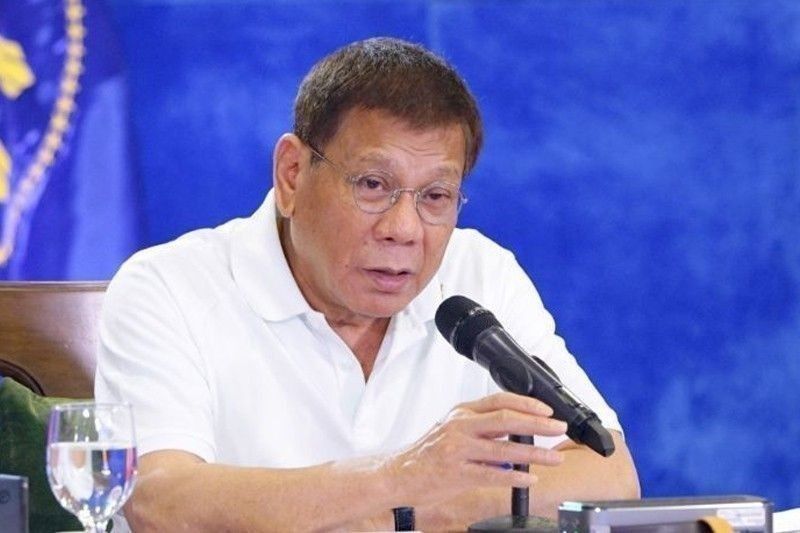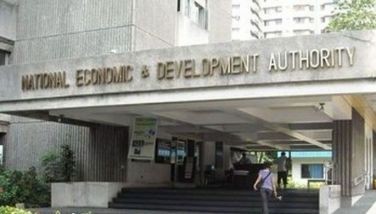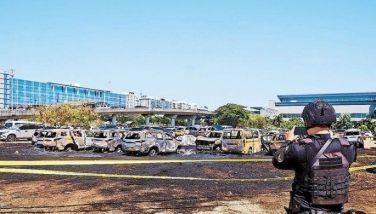Duterte to executive: Support police war on drugs

MANILA, Philippines — Former president Rodrigo Duterte wants the executive department to issue a strong statement supporting the police in its fight against drugs.
“There is a need for concrete statement, a very strong statement coming from the executive that we will protect you when you do it right and we will crush you if you do it wrong,” Duterte said in mixed English and Filipino in a video posted yesterday by Nimfa Ravelo on Twitter.
“There are only two options – right and wrong. Choose. If you choose what is wrong, you will be in a dangerous situation. If you choose what is right, all of us will be happy,” he added in Filipino.
Duterte, who the International Criminal Court is investigating for the war against drugs during his term, also warned those involved in the illegal drug trade.
“I am no longer a president, but I am warning you,” he said.
Meanwhile, the rights group Karapatan told a team of experts led by United Nations special rapporteur on extrajudicial, summary and arbitrary killings Dr. Morris Tidball-Binz that the infrastructure of impunity and draconian government policies, aside from the lack of capacity on forensic pathology, are the main factors in the non-resolution of cases of extrajudicial killings (EJKs) in the country.
In a statement issued yesterday, the Karapatan said their group held a meeting with Tidball-Binz’s team last Feb. 7.
“Karapatan welcomes the recent unofficial visit of Dr. Morris Tidball-Binz and two experts on the Minnesota Protocol regarding trainings on investigations into ‘unlawful deaths.’ However, it isn’t solely the lack of capacity on forensic pathology or knowledge of international human rights norms that are affecting government investigations on cases of extrajudicial killings,” Karapatan secretary-general Cristina Palabay said.
“It is a systemic problem driven by government policies such as those on the drug war and counterinsurgency programs – policies which have resulted in the mass murder of Filipinos, mostly from poor communities. As long as there is no acknowledgment of these impacts and as long as these policies remain, extrajudicial killings and a host of gross violations of human rights and international humanitarian law will continue,” Palabay added.
Tidball-Binz and two other experts – Dr. Stephen Cordner, a professor of Forensic Medicine at Monash University, and lawyer Kingsley Abbott, director of Global Accountability and International Justice at the International Commission of Jurists – yesterday concluded their three-day visit in the country.
Tidball-Binz, Cordner and Abbott are experts on the Minnesota Protocol on the Investigation of Potentially Unlawful Deaths, a set of guidelines for investigating deaths that may have been caused by human rights violations such as extrajudicial killings, torture, or disappearances.
The team arrived in the Philippines last Tuesday upon the invitation of Justice Secretary Jesus Crispin Remulla to aid the Department of Justice in its capacity building efforts and in its plan to install at least one forensic pathologist in each of the country’s 17 regions.
But apart from holding a capacity training for government doctors, Tidball-Binz’s team also conducted dialogues with stakeholders and various advocate groups.
During the dialogue, Karapatan said that government laws and policies such as Executive Order 70 creating the National Task Force to End Local Communist Armed Conflict (NTF-ELCAC) and the Anti-Terrorism Act, coupled with arbitrary and erroneous terrorist designation of peace consultants, human rights defenders and social movements, and the policy of “judicial harassment” and red-tagging serve as “prelude” to worse violations such as persecution and extrajudicial killings.
“For years, the government has been supported by foreign institutions with millions of funds for supposed trainings on human rights, including those for forensic investigations, and yet, aside from the lack of improvement in the human rights situation in the country, there is blatant and brazen disregard for civil liberties and basic rights,” it claimed.
The group reiterated its call for an independent investigation by the UN Human Rights Council and an official investigation by UN Special Procedures into the reports of EJKs and other rights violations in the country, on top of the International Criminal Court’s resumption of investigations into the killings in connection with the drug war of the previous administration.
Tidball-Binz’s team also held a dialogue with the Commission on Human Rights yesterday, though the details of the discussion are yet to be revealed to the media.
“Dr. Tidball-Binz is here in his capacity as a forensic expert not as a UN special rapporteur. But nevertheless, I think he will take this opportunity to conduct a series of engagements with stakeholders. Maybe that’s the reason why he also scheduled a visit in our office. The purpose of the meeting is for him to know what is the human rights situation on the ground. We are very much open to having a dialogue with him,” CHR commissioner Beda Epres told CNN Philippines.
The CHR, in a statement released on Wednesday, said that while Tidball-Binz is visiting in an academic capacity, the Commission is hopeful that he and his team “will provide valuable advice n relation to the application of forensic science to human rights investigations and to address the pressing human rights situation in our country, particularly on EJK cases and other alleged unlawful deaths.”
The commission said it “shall actively take part in contributing inputs based on reports and information from our regional offices and Protection and Policy clusters at the CHR Central Office.”
“As the country’s independent national human rights institution, the Commission continues to be willing and ready to constructively engage with the government in pursuit of truth, justice, and accountability,” the CHR added. – Elizabeth Marcelo
- Latest
- Trending

























